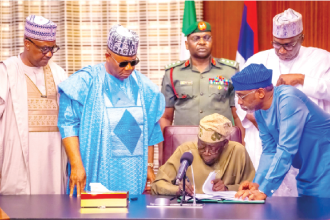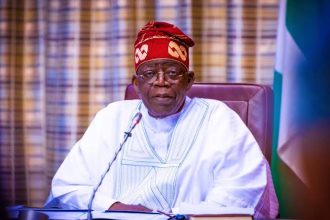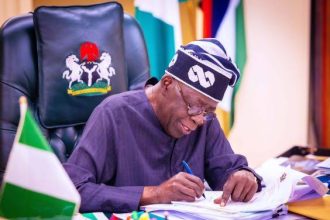The Nigerian naira plunged to new lows on the parallel market on Wednesday, as dwindling reserves and dollar inflows have made it difficult for the Central Bank of Nigeria (CBN) to fund corporate and individual demand for the greenback.
The local currency weakened to 1,030 naira per dollar on Wednesday from 1,015 the previous day, according to Abubakar Mohammed, chief executive officer of Forward Marketing Bureau de Change Ltd., which compiles data on the informal market in Lagos, the commercial capital.
The rate has diverged further from the official rate, which was cited at 765.8 a dollar on the FMDQ OTC trading platform. That showed further pressure remained to devalue after Africa’s most populous nation allowed its currency to trade more freely in June as part of reforms to help attract more foreign investment and boost the economy.
Analysts say the naira is likely to continue to weaken in the near term, as the CBN faces an uphill battle to stabilize the currency. The bank has already raised interest rates and introduced other measures to try to curb inflation and attract foreign investment, but the impact has been limited so far.
The naira’s depreciation is having a negative impact on the Nigerian economy. It is making it more expensive for businesses to import goods and services, and it is reducing the purchasing power of consumers. The depreciation is also making it more difficult for the government to service its debt, which is largely denominated in foreign currencies.
The Nigerian government has said that it is committed to stabilizing the naira and boosting the economy. However, it is unclear how it will achieve these goals in the face of the current challenges.
Implications for Businesses and Consumers
The naira’s depreciation is having a negative impact on businesses and consumers in Nigeria. Businesses are facing higher costs for imported goods and services, and consumers are seeing their purchasing power erode.
For businesses, the naira’s depreciation is making it more difficult to compete with foreign competitors. It is also making it more difficult to plan for the future, as the value of the naira is unpredictable.
For consumers, the naira’s depreciation is making it more expensive to buy basic goods and services. It is also reducing the amount of money that people have to save and invest.
The Nigerian naira’s plunge to new lows on the parallel market is a worrying development for the country’s economy. The depreciation is having a negative impact on businesses and consumers, and it is making it more difficult for the government to service its debt.
The Nigerian government has said that it is committed to stabilizing the naira and boosting the economy. However, it is unclear how it will achieve these goals in the face of the current challenges.
Nigerian Businesses and Consumers Adapt to Naira’s Depreciation
Despite the challenges posed by the naira’s depreciation, Nigerian businesses and consumers are adapting to the new reality.
Some businesses are passing on the higher costs of imported goods and services to consumers. This is leading to higher prices for everything from food to fuel.
Other businesses are trying to find ways to reduce their reliance on imported goods and services. This includes sourcing more inputs locally and developing new products and services that can be exported.
Consumers are also adapting to the naira’s depreciation. Some people are cutting back on spending, while others are looking for ways to earn extra income. For example, some people are starting small businesses or working part-time jobs.

The naira’s depreciation is a challenge for Nigeria, but it is also an opportunity for the country to become more self-reliant and competitive. By adapting to the new reality, Nigerian businesses and consumers can help to build a stronger economy.
Government’s Efforts to Stabilize the Naira
The Nigerian government is taking a number of steps to try to stabilize the naira. These include:
- Raising interest rates
- Introducing a new foreign exchange policy that allows the naira to trade more freely
- Injecting more dollars into the economy
- Cracking down on illegal foreign exchange transactions
The government is also working to improve the country’s business environment and attract more foreign investment. These efforts are aimed at boosting the economy and making it less reliant on oil exports.
It is too early to say how successful the government’s efforts will be in stabilizing the naira. However, the government’s commitment to addressing the problem is a positive sign.
The Nigerian naira’s depreciation is a challenge for the country, but it is also an opportunity for Nigeria to become more self-reliant and competitive. By adapting to the new reality and taking steps to stabilize the naira, the Nigerian government and businesses can help to build a stronger economy.
Source: Bloomberg












